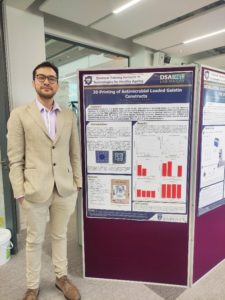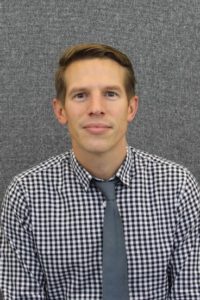Meet the authors of the runner-up paper
3D printable gelatin/nisin biomaterial inks for antimicrobial tissue engineering applications
Mateo Dallos Ortega, Jenny Aveyard, Alexander Ciupa, Robert J. Poole, David Whetnall, Julia G. Behnsen and Raechelle A. D’Sa
 |
Mateo Dallos Ortega’s academic path combines acoustic and biomedical engineering, with a focus on health technologies. He earned a BSc in Acoustical Engineering at the University of Southampton, focusing in biomedical signal processing. This led to a postgraduate diploma in Biomedical Engineering at Tufts University, focusing on biomaterials and their biological interactions. He then completed an MSc and is now nearing the completion of his PhD in Biomedical Engineering at the University of Liverpool, researching material design and evaluation for clinical use. This interdisciplinary training drives his commitment to applied research that improves healthcare and enhances quality of life. |
|
|
 |
Jenny Aveyard is a lecturer in Polymer Biomaterials in the Department of Materials, Design and Manufacturing in the School of Engineering at the University of Liverpool. She has a degree in Applied Microbiology and a PhD in Chemistry from the University of Liverpool. Her interests include the synthesis, functionalisation, and characterisation of nanomaterials for drug delivery and diagnostics applications |
|
|
 |
Alexander Ciupa earned his PhD from the University of Bath in 2013, focusing on chalcone derivatives for cancer research and tissue engineering. He then managed teaching and analytical research facilities in the Department of Chemical Engineering until 2017, when he joined the Materials Innovation Factory (MIF). Alex specializes in spectroscopy and chromatography while pursuing his own research interests in the development of simple fluorescent sensors for the detection of toxic metals. He has authored over 13 peer-reviewed papers, including six as sole author. |
|
|
 |
Rob Poole is the Harrison Chair of Mechanical Engineering at the University of Liverpool. He has research interests in the areas of rheology, complex fluids and non-Newtonian fluid mechanics encompassing both experimental, theoretical and numerical approaches. He is currently President of the British Society of Rheology and co-Editor-in-Chief of the Journal of Non-Newtonian Fluids Mechanics |
|
|
 |
David Whetnall is a Senior Research Technician at the Materials Innovation Factory, University of Liverpool. With more than 15 years’ experience in both industry and academia, he specialises in rheology and formulation science, with a focus on using automation for high-throughput formulation and characterisation. |
|
|
 |
Julia Behnsen is a technical specialist for X-ray microCT analysis at the University of Liverpool, UK. Her work focuses on supporting a wide range of materials research with experiment design, data collection, and image analysis. Julia has a degree and a PhD in physics from Leibniz University Hannover, Germany. |
|
|
 |
Raechelle D’Sa is a Professor of Antimicrobial Biomaterials at the University of Liverpool. Her research focuses on engineering advanced biomaterials combined with alternative antimicrobial agents such as nitric oxide and antimicrobial peptides. Through an interdisciplinary approach that brings together materials science, microbiology, and biomedical engineering, her work enables the development of targeted therapies. Raechelle’s group is dedicated to combating antimicrobial resistance and enhancing treatment outcomes in infectious diseases through innovative, biomaterial-based solutions. |
What aspect of your work are you most excited about at the moment?
As conventional antibiotics become less effective, there is an urgent need for alternative strategies to target drug-resistant infections. We are proud to be at the forefront of developing innovative, advanced materials-based delivery systems for bioinspired antimicrobials, addressing the global challenge of antimicrobial resistance.
How do you feel about Materials Advances as a place to publish research on this topic?
Materials Advances provides an excellent platform for disseminating high-quality interdisciplinary research with real-world impact. It has a strong track record in both fundamental and applied studies making it an ideal venue for research at the interface of materials science and healthcare.
Can you share one piece of career-related advice for early career scientists?
Stay curious and don’t be afraid to explore outside your comfort zone. Interdisciplinary work often leads to the most exciting breakthroughs.

















